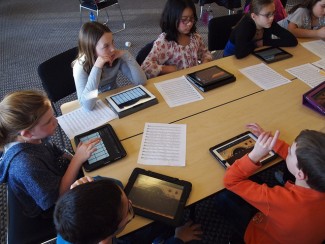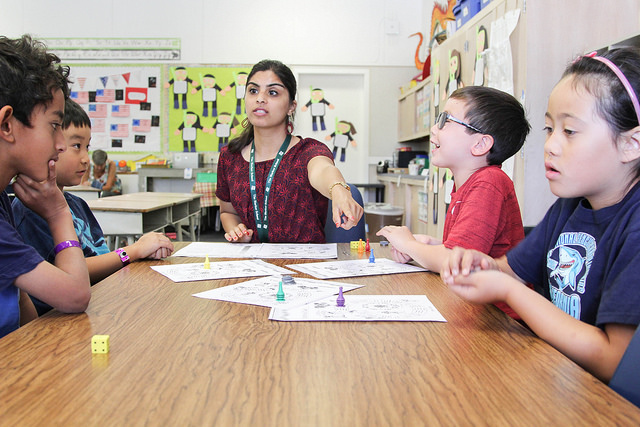“Hello, my name is…” “How are you?” “I like your shirt.” “Nice talking to you.” “See you tomorrow.”
These phrases seem simple enough, but children who struggle with social relationships frequently have difficulty with basic conversational skills, like how to start and finish conversations with their peers. Sometimes a child just need to be taught how to talk to adults and other children.Others need to be taught specific skills, such as how to introduce themselves, how to compliment someone, and how to end a conversation. In this edition of the LearningWorks for Kids Beyond Games series we suggest strategies that can help improve a child’s conversation skills.
Recognize and engage other interests. Children with social-communicative problems may struggle to understand that other people have differing interests. A child could benefit from learning to initiate a discussion about someone else’s interests. Starting in the home setting, where he has observed a parent or sibling having different interests than he has, may be most effective. Help him to learn enough about a subject to initiate a conversation about things such as sports or a favorite television program. This is a difficult skill that involves more than simply talking with others, and it requires practice.
[cjphs_content_placeholder id=”73539″ random=”no” ]Learn how to end a conversation. Some children are rather abrupt in shifting their attention from a conversation to something else or may stop making eye contact or start talking about other things. Teach a child how to end a conversation through statements such as, “It was nice talking to you,” or, “I have to go now, but we’ll talk again soon.” Have him observe you in conversation with others and use role play to show him how to pay attention to cues that someone else wants to end a conversation.
Practice complimenting others and being positive. This important skill can help children to get along with others and increase one’s likability. It is important that praise be genuine and that it focus on effort more than on actual outcome: “You must feel good about the way you stayed with that project, even when it was difficult.” Besides modeling this type of verbalization, encourage a child to use these skills in social situations and then ask him what he has observed as a result of encouraging another person.

Image: Flickr user Brad Flickinger
Introduce a child to new people. Prior to doing so have him practice making eye contact, asking an appropriate question, and then remembering what he has heard. Being prepared to meet someone new could help him to feel more comfortable in these social settings. Then ask him to introduce you to one of his friends.
Practice giving someone else the floor. Many children with communication difficulties engage in one-sided conversations in which they either talk without listening or do not know how to respond effectively to another person’s communication. Practice the back-and-forth of good conversational skills by having a one-on-one conversation with him in which the speaker holds onto something such a microphone, telephone receiver, a cell phone, or even a good old-fashioned “talking stick” as a prop to determine whose turn it is to talk and whose it is to listen.
Complementing these core strategies with the use of apps, websites, and other technologies often leads to the best solutions to improve a child’s ability to improve social thinking through better conversational skills. Tech tools that help a child with improving conversational skills include games, apps, and sites like:
 Be Confident in Who You Are is the first of the popular Middle School Confidential young adult book series. Appropriate for users aged 8 and older, the book explores themes of identity and self-esteem, perfect for kids transitioning to middle school. With beautiful graphics and immersive sound, Be Confident in Who You Are can help children be objective as they look at themselves in relation to others.
Be Confident in Who You Are is the first of the popular Middle School Confidential young adult book series. Appropriate for users aged 8 and older, the book explores themes of identity and self-esteem, perfect for kids transitioning to middle school. With beautiful graphics and immersive sound, Be Confident in Who You Are can help children be objective as they look at themselves in relation to others.
 Kidzworld is an interactive website that gives kids the platform to publish writing, upload photos, discuss current events, and be social with one another with the safety of human moderators. Kids will exercise self-awareness as they navigate an online social scene from the comfort and safety of their own computer chairs.
Kidzworld is an interactive website that gives kids the platform to publish writing, upload photos, discuss current events, and be social with one another with the safety of human moderators. Kids will exercise self-awareness as they navigate an online social scene from the comfort and safety of their own computer chairs.
Featured image: Flickr user Jencu





Social skills is something that is being less and less common with the upcoming generation. There are many reasons for it. Some like to blame technology and entitlement. There’s also more children being diagnosed with autism and a common symptom of that is lack of social skills. We need to do all we can to help our future learn how to interact with each other respectfully!